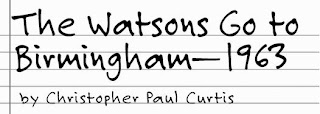- Have I made an impact in my students' lives?
- Will they remember what I've taught them?
- Will they take information from my class and apply it elsewhere?
One of the best ways to help students retain information is by providing them with meaningful assessments--assessments in which they can create, analyze, and synthesize. Meaningful assessments give students a purpose for completing an assignment. Rather than simply completing the task for a grade, students make the task purposeful.
In my attempts at helping students discover a purpose f
or each unit, I have developed assessments that move beyond basic recall questions. For example, at the end of the O. Henry short story unit the students created their own short stories using similar plot structure. The following units that I will
be completing with the students revolve around the following texts: The Watsons Go to Birmingham, 1963 and To Kill a Mockingbird.
At the end of the Watson Unit, I was thinking of having the students create a journal for one of the characters, in which they describe the various settings, conflicts, and characters of the text, building upon the elements of fiction that we p
reviously discussed during our short story units.
As for the TKAM Unit, I am still unsure as to how I want to assess the students, yet make it meaningful at the same time. Any suggestions?

Photo courtesy of scholastic.com
assessments are the trickiest thing you'll ever have to do--- it is next to impossible to make them both high level and successfully ascertain that your students understand basic principles. I think the fear is that if we ask them to synthesize without being positive that they understand low level basics then we are setting them up for failure. When I was in the classroom I usually just stacked basic level questions in tests and then had a project that was a part of the final grade that was more about creative response. But how do you grade creativity?
ReplyDeleteYou may have to take the plunge and just go for an overall creative assessment.
I was once required to manufacture a boardgame that showed the progression of a story and used plot devices as game-cliff-hangers (Think of Going to Jail in Monopoly as the arrest of a character) and for Mockingbird you might really get something cool out of it!